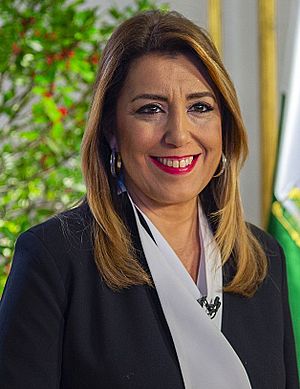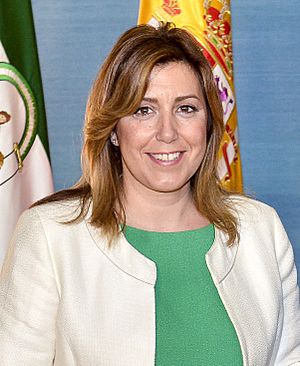Susana Díaz facts for kids
Quick facts for kids
Susana Díaz
|
|
|---|---|
 |
|
| 5th President of the Autonomous Government of Andalusia | |
| In office 5 September 2013 – 18 January 2019 |
|
| Monarch | |
| Deputy |
|
| Preceded by | José Antonio Griñán |
| Succeeded by | Juanma Moreno |
| Secretary-General of the Socialist Workers' Party of Andalusia | |
| In office 23 November 2013 – 23 July 2021 |
|
| President | Micaela Navarro |
| Preceded by | José Antonio Griñán |
| Succeeded by | Juan Espadas |
| Member of the Congress of Deputies | |
| In office 1 April 2004 – 2 April 2008 |
|
| Constituency | Seville |
| Member of the Senate | |
| Assumed office 22 July 2021 |
|
| Appointed by | Parliament of Andalusia |
| In office 21 December 2011 – 6 May 2012 |
|
| Appointed by | Parliament of Andalusia |
| Member of the Parliament of Andalusia | |
| In office 3 April 2008 – 25 September 2021 |
|
| Constituency | Seville |
| Member of the Seville City Council | |
| In office 4 July 1999 – 2 April 2004 |
|
| Personal details | |
| Born |
Susana Díaz Pacheco
18 October 1974 Seville, Andalusia, Spanish State |
| Citizenship | Spanish |
| Political party | Spanish Socialist Workers' Party |
| Spouse | José María Moriche Ibáñez |
| Children | José María |
| Parents | José Díaz Rosa Pacheco |
| Alma mater | University of Seville |
| Signature |  |
Susana Díaz Pacheco (born October 18, 1974) is a politician from Andalusia, a region in southern Spain. She was a leader in the Spanish Socialist Workers' Party of Andalusia (PSOE–A), which is a major political party in the region.
From 2013 to 2019, she was the president of Andalusia. She took over after the previous president, José Antonio Griñán, resigned. She won an election in 2015 to keep her job but was later defeated in a party leadership contest in 2017 by Pedro Sánchez.
Contents
Early Life and Education
Susana Díaz was born in Seville, Spain. She is the oldest of four sisters. Her father, José Díaz, was a plumber, and her mother, Rosa Pacheco, was a housewife.
For her education, Díaz went to the University of Seville, where she studied law. In 2015, she and her husband had a son.
Political Career
Díaz became involved in politics at a young age. She held different roles in the Spanish Socialist Workers' Party, often called PSOE for short. Her career took her from city government all the way to the national level.
Early Roles in Government
From 2004 to 2008, Díaz was a member of the Congress of Deputies, which is part of Spain's national parliament. Later, from 2011 to 2012, she served as a senator, representing her home region of Andalusia.
In 2012, she was given an important job in the government of Andalusia. She became the Minister of the Presidency and Equality. This role put her in charge of important government operations.
President of Andalusia
In 2013, Susana Díaz became the president of Andalusia. This is the highest political office in the region, similar to being a governor in other countries.
First Term as President (2013–2015)
When Díaz first became president, her party (PSOE) did not have enough votes to govern alone. So, they formed a team, or a coalition, with another party called the United Left. Working together, they were able to lead the government.
During this time, there was a big change in her party at the national level. The main leader, Alfredo Pérez Rubalcaba, stepped down. Díaz was a powerful figure in the party and helped choose the new leader. She and other regional leaders supported Pedro Sánchez, who won the election and became the new head of the national PSOE party.
Second Term as President (2015–2019)
After a disagreement with the United Left, Díaz decided to call an early election in 2015. She hoped her party could win enough votes to govern without needing a partner.
During her campaign, she argued against the spending cuts made by Spain's central government, which was led by Prime Minister Mariano Rajoy. She promised that her party would not team up with the main rival party, the PP, or a new party called Podemos.
In the election, the PSOE won 47 seats, the same number as before. Even though they didn't gain seats, it was seen as a success because their main rival, the PP, lost a lot of seats. Two new parties, Podemos and Citizens, also won seats for the first time.
After weeks of talks, Díaz made a deal with the Citizens party. With their support, she was re-elected as the president of Andalusia in May 2015.
Challenges in National Politics
In 2015 and 2016, Spain had two national elections because the parties couldn't agree on who should be prime minister. The PSOE, led by Pedro Sánchez, came in second place both times.
Sánchez wanted to form a government with other parties to remove Prime Minister Rajoy from power. However, Díaz and other regional leaders in her party disagreed. They did not want Sánchez to make a deal with the anti-austerity party Podemos. This disagreement led to a major crisis within the PSOE party in 2016.
The internal conflict resulted in Pedro Sánchez resigning as the party leader. A temporary leadership group took over and decided to allow Rajoy to form a government to avoid a third election.
Running for Party Leader
In 2017, the PSOE held an election to choose a new permanent leader. Susana Díaz decided to run. She had the support of many famous past leaders of the party.
Her main opponent was Pedro Sánchez, the same person she had helped remove from power. Sánchez presented himself as the candidate for regular party members, while painting Díaz as the choice of the party's old guard. In the end, Sánchez won the election, and Díaz remained the leader in Andalusia.
Losing Power in Andalusia
In 2018, Pedro Sánchez successfully became the Prime Minister of Spain. This caused problems for Díaz in Andalusia because her coalition partner, the Citizens party, did not support Sánchez's new government. They withdrew their support from Díaz, which led to another early election in Andalusia.
In the 2018 Andalusian regional election, Díaz's PSOE party lost 14 seats. Although they were still the biggest party, they didn't have enough seats to govern. The other parties, including the PP, Citizens, and a new party called Vox, joined together to form a new government. In January 2019, Susana Díaz's time as president of Andalusia came to an end.
See also
 In Spanish: Susana Díaz para niños
In Spanish: Susana Díaz para niños
 | Jackie Robinson |
 | Jack Johnson |
 | Althea Gibson |
 | Arthur Ashe |
 | Muhammad Ali |


